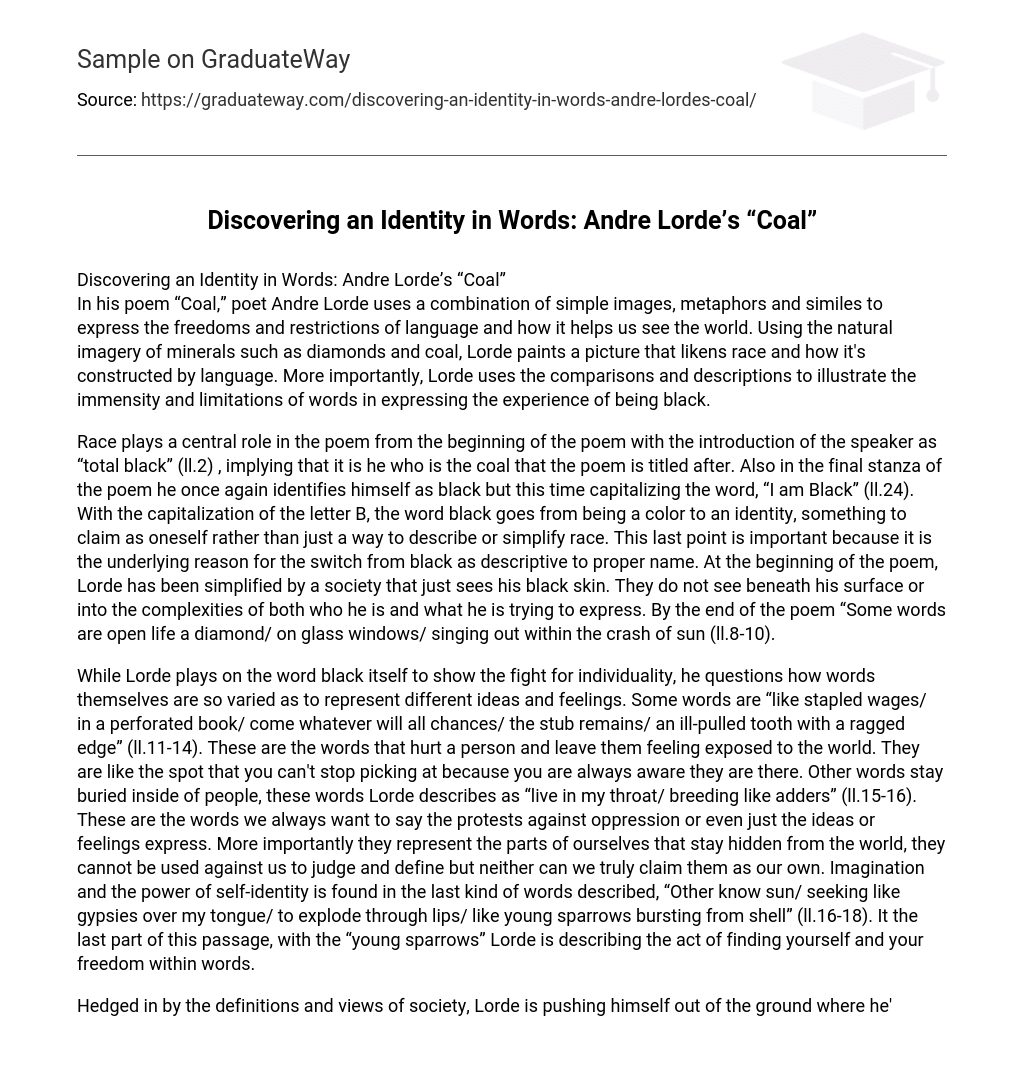In his poem “Coal,” poet Andre Lorde uses a combination of simple images, metaphors and similes to express the freedoms and restrictions of language and how it helps us see the world. Using the natural imagery of minerals such as diamonds and coal, Lorde paints a picture that likens race and how it’s constructed by language. More importantly, Lorde uses the comparisons and descriptions to illustrate the immensity and limitations of words in expressing the experience of being black.
Race plays a central role in the poem from the beginning of the poem with the introduction of the speaker as “total black” (ll. 2), implying that it is he who is the coal that the poem is titled after. Also in the final stanza of the poem he once again identifies himself as black, but this time capitalizing the word, “I am Black” (ll. 24). With the capitalization of the letter B, the word black goes from being a color to an identity, something to claim oneself rather than just a way to describe or simplify race. This last point is important because it is the underlying reason for the switch from black as descriptive to proper names. At the beginning of the poem, Lorde has been simplified by a society that just sees his black skin. They do not see beneath his surface or into the complexities of both who he is and what he is trying to express. By the end of the poem “Some words are open life a diamond/ glass windows/ singing out within the crash of sun (ll. 8-10).
While Lorde plays on the word black itself to show the fight for individuality, he questions how the words themselves are so varied as to represent different ideas and feelings. Some words are “like stapled wages/ in a perforated book/ come whatever will all chances/ the stub remains/ an ill-pulled tooth with a ragged edge” (ll. 11-14). These are the words that hurt a person and leave them feeling exposed to the world. They are like the spot that you can’t stop picking because you are always aware they are there. Other words stay buried inside of people, these words Lorde describes as “live in my throat/ breeding like adders” (ll. 15-16). These are the words we always want to say the protests against oppression or even just the ideas or feelings express.
More importantly, they represent the parts of ourselves that stay hidden from the world, they cannot be used against us to judge and define but neither can we truly claim them as our own. Imagination and the power of self-identity is found in the last kind of words described, “Other know sun/ seeking like gypsies over my tongue/ to explode through lips/ like young sparrows bursting from shell” (ll. 16-18). It the last part of this passage, with the “young sparrows” Lorde is describing the act of finding yourself and your freedom within words.
Hedged in by the definitions and views of society, Lorde is pushing himself out of the ground where he’s been forced to grow. However, in being discriminated against because of his color, he was able to find through words and experience a feeling of himself. He becomes in his use of language not just a color, but a multi-faceted jewel, “As the diamond comes into a know of flame/ I am Black because I come from the earth’s inside/ Now take my word for jewel in the open light” (ll. 22-24). His words have been created through his experience and can show something beyond the ideas of the racist society.





